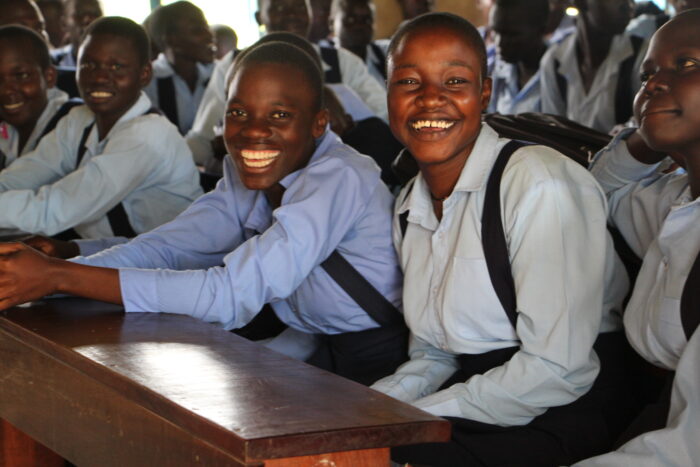2022 Cash Transfers to Schoolgirls Commence!
November 8, 2022 8:20 amGESS is scheduled to kick off payment of cash transfers to girls across the country on 8th November 2022.
Cash transfers are direct payments made to girls enrolled in classes Primary 5 to Senior 4 who are regularly attending classes. The 2022 cash transfers will support over 448,000 girls across South Sudan to access and remain in school.

Girls in candidate classes – Primary 8 (P8) and Senior 4 (S4) – will receive SSP 14,400. This is to ensure that girls in P8 and S4 are equipped to deal with the higher financial pressure associated with final examinations. Girls in P5, P6 and P7 and S1, S2 and S3 will receive SSP 11,000.
Schoolgirls receive this payment because they still face many additional barriers to education, such as early and forced marriage, early pregnancy and an uneven share of household chores. Cash transfers also help to alleviate the financial barrier to education, lifting the burden off parents and learners by enabling them to afford school-enabling items, such as school uniforms, stationery, and sanitary towels.
Cash transfers have helped to alleviate the economic barriers that previously prevented recipients from accessing education. In 2014, girls accounted for <40% of all learners in South Sudan, rising to 49% by 2021. An independent analysis of the impact of GESS cash transfers between 2014- 2016, found that the money helped to increase both the enrolment and attendance of girls.
“Over the years, since 2014, we’ve seen the impact of the cash transfers on the lives of schoolgirls. The financial barrier is a major reason why girls drop out of school or are not enrolled in school across South Sudan. As a programme that wants to see girls enrol in school, stay in school, and complete school, cash transfers are a major aspect that address this financial barrier. We want to ensure that every girl has the ability to be in school and complete her education,” Akuja de Garang, GESS Team Leader.
Education of girls has the power to lift societies out of the cycle of poverty and violent conflict. Educating women and girls should be recognised as an investment that will yield better results for the individual, families and the nation. Peace Abulu, the British Embassy Juba Education Adviser highlights that “We all have a role to play in ensuring all children have equal access to education and a safe learning environment”.
This year, GESS has taken further steps to ensure that the right girls receive the cash transfers by issuing Unique Learner IDs. The Unique Learner ID was issued to learners on admission in their respective schools and later transferred to their Cash Transfer Enrolment Forms during validation. Each learner is expected to have their Cash Transfer Enrolment Form (CTEF) at the time of payment with a corresponding Unique Learner ID on the CTEF and admission register.
Girls who have been approved for payment should receive the full amount of their cash transfer with no deductions. Any attempt to take funds away from the girls, whether by teachers, officials, police, or anyone else, is a serious offence, and will be dealt with in an appropriate manner. Any girl who experiences this should report the incident through the number provided below or ask their parent or guardian to help them to do so.
We advise parents and guardians to accompany girls under the age of 18 to the payment centre to guarantee that they receive the correct amount and to ensure their safety when traveling home after the payment. Girls are also advised to travel home in groups of three or more.
GESS has zero tolerance to misappropriation/theft of funds and therefore urges all stakeholders, parents, and learners to report any misappropriation or safeguarding concerns or threats during the cash transfer payment process. This can include:
- Reduction of money during the payment process
- Replacement of girls who are absent during payment
- Issuing CTEFs to girls who are not the correct owner.
To report any misappropriation or safeguarding concerns, or if you have any queries, please contact one of our hotline numbers below:
- +211 928 520 824
- +211 917 647 891
The GESS programme receives funding through UK aid from the UK Government, the Government of Canada through Global Affairs Canada, the U.S. Agency for International Development (USAID) and the European Union. The Ministry of General Education and Instruction (MoGEI) supports the GESS programme, which is managed by implementing partners who provide technical advice. These implementing partners include Cambridge Education/Mott MacDonald as the consortium lead, BBC Media Action, Montrose, Leonard Cheshire and Windle Trust International, together with seven State Anchor NGOs that implement the programme in the ten states and three administration areas of South Sudan.
Tags: Cash Transfers, European Union, FCDO, GESS, girls' education, Global Affairs Canada, UKaid, USAIDCategorised in: Cash Transfers
Comments are closed here.